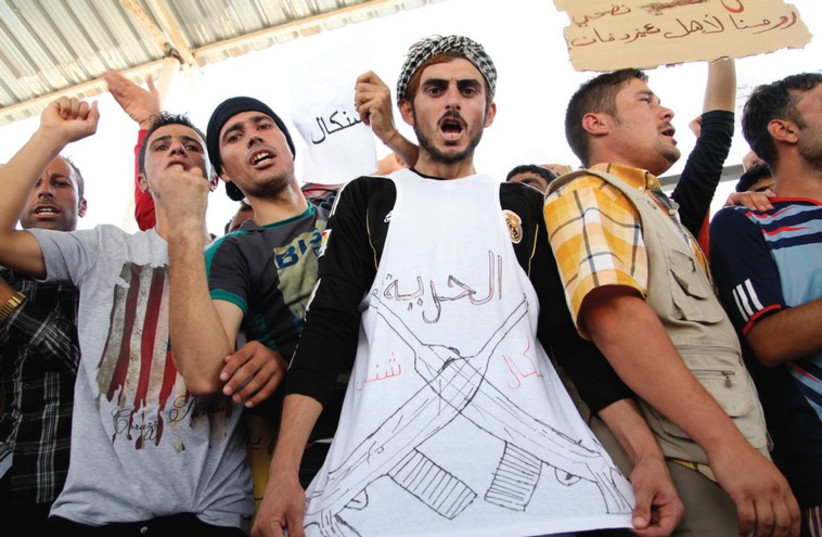August 3 marks eight years since the Yezidi Genocide, perpetrated by the so-called Islamic State (ISIS) against the largely unarmed and defenseless Yezidi community in the Sinjar region of Iraq. The surviving Yezidi community remains at risk, their villages in rubble and their families mostly living in internally displaced camps.
The Yezidi experience has ongoing significance for the Middle East and the region’s other religious minorities. Of course, such persecution is not new. Multiple instances of mass atrocities and genocide have taken place in recent memory, including the Armenian Genocide and the targeting of Christian, Jewish and non-conforming Muslim minorities.
To be sure, persecution of the Yezidi community is not new. The systematic marginalization, exclusion, and persecution of Yezidis have been ongoing for centuries. Yezidis have suffered 74 instances of atrocities, what they refer to as ferman, since the 13th century. Even today, many Iraqis will not eat food made by Yezidis’ hands. Neighbors who hold on to negative stereotypes of the Yezidi people refer to them as devil-worshippers, unclean or infidels.
This type of demonization poses great danger to all minority communities – Yezidis and others. Exclusion of religious or ethnic groups causes real-world consequences in the social and economic lives of affected community members. But when extremist dogma takes hold, as occurred when ISIS overran vast swaths of territory, persecuted minority communities face grave danger. As evidenced by the Yezidi Genocide, if a well of antipathy toward a group is already present, extremists can capitalize on this and bring forth the worst aspects of human nature.
The Global Coalition to Defeat ISIS has successfully beaten ISIS militarily, and there is no longer a territorial caliphate where ISIS makes and enforces its brutal rules, but the root causes that led to the religious hatred and mass atrocities directed at the Yezidis remain. While the United States and its allies have taken notable steps to support and protect religious minorities in the Middle East, confront extremists militarily and work with responsible regional governments, the threat has not vanished. The international community must remain vigilant and that includes making a number of key commitments.

Points to be made
First, it is imperative to address the underlying hate and discrimination. So long as millions of children are exposed to hatred, discrimination and extremist dogma targeting vulnerable minorities, future atrocities can occur. While maintaining the pressure on armed extremist groups, like ISIS, international stakeholders should also invest time and energy promoting the full political, legal, social and economic inclusion of religious minority communities.
Second, improved systems to monitor early warning signs are essential if states wish to uphold their obligations as stipulated by the Genocide Convention and other treaties. The Global Coalition has spent enormous funds in defeating ISIS, with thousands of combatants and civilians in Syria and Iraq killed during ground combat.
Had the international community reacted in 2013 and early 2014, the growth of ISIS could have been slowed or even prevented. As we reflect on past, current and prospective mass atrocities facing Afghan, Rohingya, Tigray, Ukrainian and Uighur populations, among others, we ought to bear in mind the benefit of prevention as opposed to the enormous human and financial cost of reactive policies.
Third, while we can’t turn the clock back to prevent the Yezidi Genocide, those who perpetrated or facilitated this atrocity must be held accountable. Although thousands of ISIS members from around the world participated in these atrocities, until now, most have only been tried for terror-related charges. Crimes committed against Yezidis have largely gone unpunished. This sends a message of impunity.
And finally, the international community should redouble efforts to facilitate Yezidi recovery and help the surviving community with economic tools, education, and inclusion into the social and economic fabric of Iraq. This will aid post-conflict recovery and help prevent future exclusion, marginalization, and suffering of the vulnerable and highly traumatized Yezidi community.
As we commemorate the eighth anniversary of the Yezidi Genocide, we must prioritize to resolve the outstanding challenges confronting this vulnerable community and implement the lessons learned from this dark chapter to ensure that we never again witness an attempt to annihilate an entire people because of who they are and what they believe.
Pari Ibrahim is founder and executive director of the Free Yezidi Foundation. Susan Heller Pinto is vice president for international policy at the Anti-Defamation League.
